Biopolitical Imperialism by M. G. E. Kelly

Author:M. G. E. Kelly [Kelly, M. G. E.]
Language: eng
Format: epub
ISBN: 978-1-78279-345-8
Publisher: Zero Books
Published: 2015-07-30T16:00:00+00:00
4
Aid
Accordingly, with admirable, though misdirected intentions, they very seriously and very sentimentally set themselves to the task of remedying the evils that they see. But their remedies do not cure the disease: they merely prolong it. Indeed, their remedies are part of the disease. – Oscar Wilde
In the previous chapter, we dealt with flows from Third World to First. In this chapter, we will deal with flows in the opposite direction, principally with what is called ‘aid’. Aid comprises money and material, accompanied only in a limited and for the most part temporary way by personnel. It seems to be characterisable largely as one of many economic flows, then.
The pattern of economic flows has long been inimical to the Third World. Suffering the ‘Lucas Paradox’, it has historically attracted little investment. Burdened with massive debts, the balance of its economic flows has tended to be strongly outward. This is so even excluding the extent to which trade is unequal exchange to the advantage of the First World, such that the formal valuation of its exports relative to the value of what it imports misrepresents the cost of production.
Exceptions to this pattern abound, however, and recently the pattern has been rather different. The current pattern is for Third World economies that are growing rapidly to export capital, whereas ones that aren’t are now major importers. On average, the poorer a country is, the greater the percentage of its GDP is composed by inflowing capital, and the greater the proportion of this inflow is composed of aid.
Now, this might seem like a desirable pattern, that poor countries need this money to develop. However, foreign direct investment and loans both have obvious drawbacks: loans must be repaid with interest, and investors are seeking a return, that is, are predatory and exploitative. While such flows can be an overall boon, they often are not. Investment is not about biopolitics—it’s about commercial interests that may care for their own workers but won’t invest in the broader economy unless they are forced to. Loans may be used to pay for biopolitical infrastructure, but create indebtedness, and in recent decades have been made conditional on actively destroying biopolitics, which has been seen as a brake on economic development because of the portion of GDP tied up in paying for it.
Aid, by contrast, would seem to be an unmitigated bonus: one might imagine that aid is essentially free, coming without strings attached. This is not true, however. Most of what is classified as First World ‘aid’ to the Third World is actually composed of development loans. Moreover, even where aid is not explicitly conditional, there is often some diplomatic or economic quid pro quo expected. The typical image of aid, propagated by NGOs in their appeals for funding from the First World public, actually represents only a small sector of aid. I will argue, however, that even aid that is entirely gratis and unencumbered with expectations is still generally pernicious from a biopolitical point of view.
Download
This site does not store any files on its server. We only index and link to content provided by other sites. Please contact the content providers to delete copyright contents if any and email us, we'll remove relevant links or contents immediately.
| Elections & Political Process | Ideologies & Doctrines |
| International & World Politics | Political Science |
| Public Affairs & Policy | Specific Topics |
| United States |
The Secret History by Donna Tartt(19092)
The Social Justice Warrior Handbook by Lisa De Pasquale(12190)
Thirteen Reasons Why by Jay Asher(8912)
This Is How You Lose Her by Junot Diaz(6887)
Weapons of Math Destruction by Cathy O'Neil(6281)
Zero to One by Peter Thiel(5802)
Beartown by Fredrik Backman(5755)
The Myth of the Strong Leader by Archie Brown(5508)
The Fire Next Time by James Baldwin(5447)
How Democracies Die by Steven Levitsky & Daniel Ziblatt(5219)
Promise Me, Dad by Joe Biden(5154)
Stone's Rules by Roger Stone(5088)
A Higher Loyalty: Truth, Lies, and Leadership by James Comey(4964)
100 Deadly Skills by Clint Emerson(4926)
Rise and Kill First by Ronen Bergman(4790)
Secrecy World by Jake Bernstein(4753)
The David Icke Guide to the Global Conspiracy (and how to end it) by David Icke(4720)
The Farm by Tom Rob Smith(4514)
The Doomsday Machine by Daniel Ellsberg(4490)
